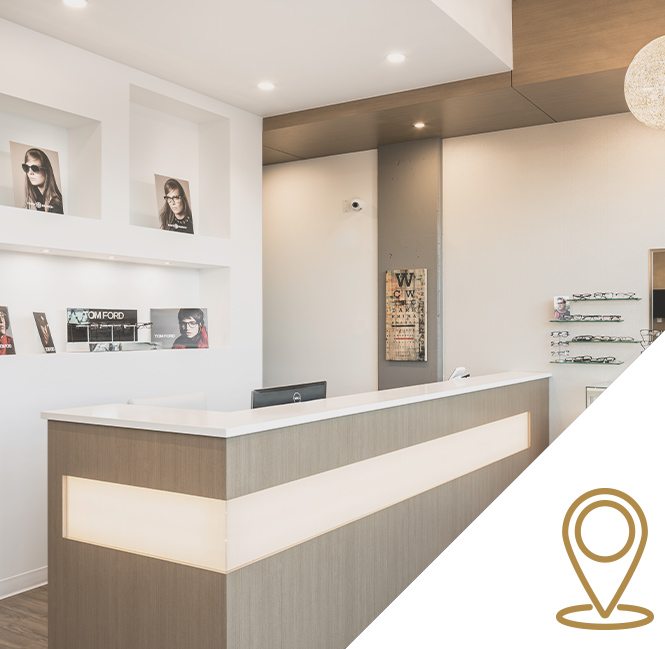Eyeglasses have come a long way from simple glass lenses. Today, they’re crafted from various materials and designed to address specific visual needs.
With advancements in optical technology, choosing the right lens can be daunting. But fear not!
Whether you need lenses for reading, driving, or protecting your eyes from the sun, there’s a perfect fit for everyone. Here’s a quick look at the various types of lenses you might consider:
- Single vision
- Bifocal
- Trifocal
- Progressive
- Computer glasses
- Photochromic
- Polarized
- High-Index
- Aspheric
Understanding the options will help you make an informed decision and ensure your eyeglasses provide the best possible vision and comfort.
Single Vision Lenses
Single-vision lenses are the most common type of eyeglass lenses. They are designed to correct a single field of vision, either distance or near vision. These lenses are ideal for people with:
- Nearsightedness (myopia)
- Farsightedness (hyperopia)
- Astigmatism
Single-vision lenses are straightforward and easy to adapt to, making them a popular choice for everyday wear.
Bifocal Lenses
Bifocal lenses are designed to correct both near and distance vision within a single lens. They are divided into two distinct sections:
- The upper part for distance vision
- The lower part for near tasks such as reading
This design allows for seamless switching between different visual ranges. These lenses are particularly beneficial for people with presbyopia, a common age-related condition that affects near vision.
Bifocals eliminate the need to switch between multiple pairs of glasses, providing convenience and improved functionality. While bifocal lenses have a visible line separating the two sections, their versatility makes them a popular choice.
Trifocal Lenses
Trifocal lenses take bifocals a step further by adding a third section for intermediate vision, usually for tasks like computer use. This intermediate section lies between the distance and near segments, providing a smooth transition across all three visual ranges.
Progressive Lenses
Progressive lenses, also known as no-line bifocals, provide a gradual transition between multiple vision zones:
- Distance
- Intermediate
- Near
They offer a seamless, aesthetically pleasing alternative to traditional bifocals and trifocals. The lack of visible lines means your glasses look just like single-vision lenses, while still offering multifocal benefits.
Progressive lenses require a short adaptation period, but this period varies with the quality of the lenses. Higher quality progressive lenses are typically easier to adapt to. Once adjusted, they provide a smooth and uninterrupted range of vision.
Computer Glasses
Computer glasses, or blue light-blocking glasses, are designed to reduce eye strain and discomfort caused by prolonged screen use. These lenses typically feature an anti-reflective coating and a slight magnification to enhance comfort during extended computer sessions.
The digital age has increased our exposure to screens, leading to digital eye strain. Symptoms include:
- Headaches
- Dry eyes
- Blurred vision
Computer glasses can mitigate these issues by optimizing your visual experience for screen use.
Photochromic Lenses
Photochromic lenses, also known as transition lenses, automatically adjust to changing light conditions. They darken when exposed to sunlight and return to clear indoors, offering convenience and protection in various environments.
These lenses provide the benefits of both regular eyeglasses and sunglasses, eliminating the need to switch between pairs. Many offer 100% UV protection, making them an excellent choice for those who frequently move between indoor and outdoor settings.
Polarized Lenses

Polarized lenses are designed to reduce glare from reflective surfaces like:
- Water
- Snow
- Glass
They’re commonly used in sunglasses to enhance visual clarity and comfort, especially in bright outdoor conditions.
These lenses are ideal for activities such as driving, fishing, and skiing, where glare can be both distracting and dangerous. Polarized lenses provide a clearer, more comfortable view by filtering out horizontal light waves.
High-Index Lenses
High-index lenses are made from advanced materials that allow them to be thinner and lighter than traditional lenses. They’re especially beneficial for people with strong prescriptions, as they reduce the thickness and weight of the lenses.
These lenses provide the same level of vision correction as standard lenses but with a more aesthetically pleasing appearance.
Aspheric Lenses
Aspheric lenses have a more complex surface profile than traditional spherical lenses. This design allows for a thinner and flatter lens, reducing distortion and providing a clearer field of vision.
These lenses are ideal for both nearsighted and farsighted people, offering improved visual clarity and a more natural appearance. Aspheric lenses are also lighter and more comfortable than traditional lenses.
Anti-Reflective Coating
Anti-reflective coating, also known as AR coating, is applied to lenses to reduce glare and reflections. This coating enhances visual clarity, especially in low-light conditions, and improves the overall appearance of your glasses.
AR coating is beneficial for both prescription and non-prescription lenses. It reduces eye strain, particularly during activities like night driving and computer use.
UV Protection
UV protection is essential for safeguarding your eyes from the harmful effects of ultraviolet rays. Prolonged UV exposure can lead to eye conditions such as cataracts and macular degeneration.
Many eyeglass lenses now come with built-in UV protection, ensuring your eyes are shielded from harmful rays.
Choosing the Right Lens for Your Needs
Selecting the right eyeglass lens involves considering your lifestyle, visual needs, and personal preferences. With so many options available, it’s important to consult with an optometrist to determine the best lenses for you.
Think about how you use your glasses daily. Are you constantly on the computer, driving, or spending time outdoors? Identifying your primary activities can help narrow down the lens options that will best suit your needs.
We Can Help You Find the Perfect Eyeglass Lenses
With the variety of lenses available, there’s a perfect match for everyone’s needs. Prioritize your visual comfort and health by selecting lenses that align with your lifestyle.
At Willoughby Doctors of Optometry, we’re here to help you find the ideal pair of glasses. Our experts are ready to guide you through the process, ensuring you receive personalized care and the best possible vision correction.
Ready to upgrade your vision? Book an appointment with us today and discover the perfect eyeglass lenses tailored to you.











